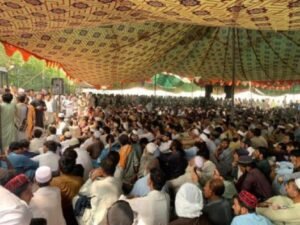ISI and the Afghan Quargmire: Unveiling the Leviathans’s Creation

Kabul in 2022 photo: @AADIL
By A. Shafaq
SYNOPSIS
In the intricate realm of geopolitics, Afghanistan has historically defied imperial ambitions. Yet, within this complex backdrop, Pakistan’s Inter-Services Intelligence (ISI) has quietly established pervasive influence, wielding unrivalled power that extends not only within its borders but also across Afghanistan. The multifaceted strategy of the ISI includes the cultivation and empowerment of the Taliban, control over socio-economic aspects, and the facilitation of illicit activities such as opium production. These calculated manoeuvres led to the resurgence of the Taliban and the consequential downfall of the US-backed Afghan government in August 2021. However, unforeseen challenges now grip the ISI, from relentless attacks by Tehreek-e-Taliban Pakistan (TTP) to escalating cross-border tensions with Afghanistan, revealing unexpected twists and exposing vulnerabilities within the ISI’s operations. The ISI’s ambitions have given rise to a complex narrative reminiscent of Frankenstein’s creation turning on its master, marking a significant setback for Pakistan’s strategic designs and propaganda. This strategic miscalculation has turned the ISI’s creation, the Taliban, into an unpredictable force, placing Pakistan’s plans and propaganda in a precarious double jeopardy.
Afghanistan’s Geopolitical Transformation
Thomas Hobbes, the 17th-century prominent English political philosopher, identified the state as an all-powerful entity akin to Leviathan, a sea monster in Biblical parlance. However, the Inter-Services Intelligence (ISI) surpasses what even Hobbes could imagine. The ISI is the Leviathan not only in its own country – Pakistan, but it would be safe to say that its tentacles are deeply entrenched in Afghanistan as well.
Afghanistan for a larger part of the modern period remained the graveyard of empires. Despite its rustic and traditional ways of life that belied modernity to gain any strength here, Afghanistan remained a country with a fiercest sense of independence. Several great powers, from Great Britain to the Soviets and the US tried to get a stranglehold of the country, but all of them had to bite the dust. But ISI, an entity which is purportedly more powerful than the Pakistan state itself, covertly and surreptitiously gained an upper hand in Afghanistan – a feat that deserves to draw awe from the world, despite the immoral, wicked and unscrupulous means it employed to gain that advantage.[1]
ISI’s propaganda and activities swept through entire Afghanistan owing to the range and scale of efforts that were put up by the spy agency to achieve a stranglehold over the lifeblood of the Afghanistan state. It carried out an all-encompassing activity including creating and nurturing the Taliban, soliciting funding for the Taliban, bankrolling Taliban operations, doing the recruitment, training, and skilling work for Taliban fighters, planning and directing offensives, providing and facilitating shipments of ammunition and fuel, providing diplomatic support as the Taliban’s virtual emissaries abroad, and directly providing combat support. Pakistan’s ISI turned the Taliban into a highly effective military force that went on to invade Afghanistan and topple the US-backed regime in 2021, understandably through the covert support of the ISI.[2]
Not only in the fields of arms, ammunition, and military equipment and services, but the ISI’s strong control and influence also extend to various aspects of Afghanistan’s socio-economic life. For instance, the cultivation of opium in Afghanistan and the subsequent transit and smuggling of these drugs into the rest of the world are also facilitated by the ISI. The exponential increase in opium production and the processing of these narcotics into substances like hashish over the years can be attributed to the ISI’s involvement.[3]
ISI’s Unforseen Regional Impact
It was ISI that helped turn the mujahideen, created by the US-Pakistan nexus to counter the Soviet occupation of Afghanistan in 1979, into Taliban once the Soviets were ousted from Afghan territory. It has to be seen as a well-crafted strategy of the ISI to create an Islamist force so that Islamic identity will subdue the Pashtun identity and thus mitigate the paranoia of the ISI concerning the dismemberment of Pakistan, especially in the Balochistan and Khyber Pakhtunkhwa region populated by Pashto ethnic group that share common ethnicity with across the Durand Line Afghan majority Pashtuns. This paranoia was further exacerbated after the dismemberment of Bangladesh from Pakistan in 1971.[4]
Despite the emergence of the Taliban as the ruling power in Afghanistan, the evolving scenario has not been as favourable as initially hoped for both ISI and Pakistan itself. The initial optimism rested on the belief that the Afghan Taliban, now in control of a neighboring country, would exert their influence to rein in and pacify the Tehreek-e-Taliban Pakistan (TTP), an extremist group notorious for mounting deadly attacks on Pakistan and its citizens. However, this hope has been dramatically shattered.
The TTP persists in its relentless and violent campaign against the Pakistani state, resulting in a harrowing toll of casualties, including the loss of numerous innocent civilians and the sacrifice of military and police personnel. Their ultimate goal remains the establishment of a Taliban-inspired, Shariah-compliant state within Pakistan’s borders, and they show no signs of relenting in their pursuit.
This unfortunate turn of events underscores the complex and often unpredictable nature of regional dynamics, where expectations of one group’s ability to influence another can prove to be misguided. As Pakistan grapples with the ongoing threat posed by the TTP, the ISI faces the challenging task of recalibrating its strategies to address these evolving security challenges and safeguard its national interests.[5]
ISI’s Taliban Gamble: Unintended Fallout
Recently, tensions have also resurfaced between the two states. Pakistan carried out cross-border air strikes into Afghanistan at the safe havens of TTP, which was resisted by the Taliban government of Afghanistan. Similarly, tensions flared up concerning the closure of the Torkham border crossing, which is the main point of transit for travellers and goods between Pakistan and landlocked Afghanistan. The two countries frequently trade blames and accusations, sometimes engaging in military offensives, with regard to border issues and armed attacks on each other’s soil.[6]
In a startling twist of geopolitical intrigue, ISI of Pakistan has found itself in a precarious role, akin to Mary Shelley’s infamous Frankenstein’s monster. This analogy draws striking parallels with the creation of the Taliban, a formidable force initially cultivated by the ISI to further its own interests.
Pakistan, with the ISI at the helm, embarked on a strategic venture that entailed the provision of safe havens, military training, arms, funds, and unwavering ideological and logistical support to the Taliban. The ISI-controlled Haqqani network was intended to be the linchpin in this elaborate puppetry, where Pakistan aimed to assert control over the Taliban government in Afghanistan, manipulating it as a puppet held firmly by the threads of the ISI’s influence. In essence, this was a high-stakes gamble that backfired. The ISI’s expectations of maintaining a tight grip on the Taliban have proven overly optimistic as well as strategically flawed. The present reality unveils a Taliban-led Afghanistan boldly defying the ISI’s directives and even engaging in conflicts with the Pakistani military. This serves as a stark reminder that complex geopolitical games can spiral beyond the control of their architects.
This is not just a diplomatic setback whereas it is a profound and abject failure of the ISI’s meticulously crafted strategy and Pakistan’s comprehensive propaganda efforts. The very entity that Pakistan sought to employ as an instrument of control has transformed into an unpredictable force, akin to an unbridled Frankenstein’s monster. This development places Pakistan’s strategic goals and carefully constructed narrative in an extremely precarious position, subjecting them to a double jeopardy of unforeseen consequences. The fallout from this strategic miscalculation reverberates extensively, fundamentally altering the dynamics of an already tumultuous region and compelling Pakistan to grapple with the unintended outcomes of its own creation.
A. Shafaq (pseudonym) is a researcher and lecturer at one of the private universities in Kabul.
Note: The contents of the article are of sole responsibility of the author. Afghan Diaspora Network will not be responsible for any inaccurate or incorrect statement in the articles.
[1] HRW Desk, Pakistan’s support of the Taliban, Human Rights Watch, https://www.hrw.org/reports/2001/afghan2/Afghan0701-02.htm accessed on September 27, 2023.
[2] Reidel, B., Pakistan’s problematic victory in Afghanistan, Brookings Institute, https://www.brookings.edu/articles/pakistans-problematic-victory-in-afghanistan/ accessed on September 27, 2023.
[3] UNODC Survey, Afghanistan Opium cultivation in 2022 up by 32 per cent, November 1, 2022, UN Office on Drugs and Crime, https://www.unodc.org/unodc/frontpage/2022/November/afghanistan-opium-cultivation-in-2022-up-by-32-per-cent_-unodc-survey.html accessed on September 27, 2023.
[4] Miller, M. C., Pakistan’s Support for the Taliban: What to know, Council on Foreign Relations, https://www.cfr.org/article/pakistans-support-taliban-what-know accessed on September 27, 2023.
[5] Mir, A., Pakistan’s Twin Taliban Problem, May 4, 2022, United States Institute of Peace, https://www.usip.org/publications/2022/05/pakistans-twin-taliban-problem accessed on September 27, 2023.
[6] Aziz, F., Afghanistan and Pakistan trade blame as key border crossing remains closed, September 12, 2023, Al Jazeera, https://www.aljazeera.com/news/2023/9/12/afghanistan-and-pakistan-trade-blame-as-key-border-crossing-remains-closed accessed on September 29, 2023.





